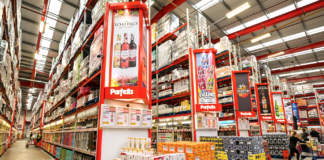The saturation of the high street by coffee chains will present exciting opportunities for independents, writes LINDSAY SHARMAN
When it comes to hot drinks, making a brew is the simple answer to life’s little problems for many of us. We love nothing more than a good cuppa and our consumption of the black stuff is consistently high. The category is worth £615m in the UK – the only thing we drink more often is water.
But these days, thanks to the ever-growing popularity of high street coffee chains, we’re becoming coffee connoisseurs too. While coffee in impulse is worth £71m, growing at 4.4%, the likes of Starbucks and Caffè Nero have raised the game for consumers and opened significant opportunities for the independent channel.
[quote_box_right]
TOP TIPS
- COFFEE MENU: Help your customers develop a coffee menu with tasting notes.
- OFFER EDUCATION: Use free coffee guides and training to help your customers.
- ETHICAL TRADING: Ensure you are working with manufacturers with the right trading credentials.
- ONE-STOP SHOP: Put syrups, cups, lids and biscuits all in one place.
- SUPPORT YOUR RETAILERS: Provide more merchandising and promotions.
[/quote_box_right]
“The high-street outlets will eventually reach saturation point and consumers will want to explore different options to broaden their repertoire,” says John Sutcliffe, channel controller, out of home and convenience, at Taylors of Harrogate.
But to succeed, caterers must look to adopt an artisan approach and offer consumers a wider range of blends. “Developing a coffee menu offering a broader choice is a good idea to follow,” says Sutcliffe. “The key is in educating consumers using the tasting notes of your beverage offer – coffee should be treated like wine.”
Although many foodservice outlets use specialist wholesalers for coffee, non-specialist wholesalers can still enjoy a good share of the market by expanding their offerings. Sutcliffe adds, “You need to ensure that you are working with manufacturers that care about their products, and focus on quality, breadth of range, and ethical trading credentials”.
Educating staff is also key and many suppliers, including Kenco Professional, offer free coffee guides and training for wholesalers’ customers to help them choose the best coffee machines or make the perfect drink.
But it’s not just the coffee that’s important – wholesalers also need to think about the practical elements of making and serving good quality coffee, to offer all-round support to their foodservice and catering customers.
[quote_box_right]
“Our best sellers are Tetley and PG tips 80s, which are both price-marked. I find the price-marked packs sell really well. Coffee-wise, the best sellers are Nescafé Instant and Taylors of Harrogate. I think more direct input from wholesalers would be helpful – hot beverages is a category that can get ignored and retailers are often left to their own devices. It would be good to be informed of any changes in direction or category innovation at wholesale level.”
Roli Ranger,
Londis, Ascot
[/quote_box_right]
“Wholesalers need to be able to provide the caterer with a simple and complete ‘coffee solution’,” says Frances Booth, category marketing manager at Lotus Bakeries. “Coffee-shop owners want to be able to find the syrups, cups, lids and biscuits all in one place, rather than having to search for each individual item.”
Innovation driving tea market
If the coffee market is all about recreating the out-of-home experience inside the home then the opposite is true for the tea market, according to Tetley’s customer marketing controller Simon Attfield.
“The thing with tea is that everyone has their own particular way of taking it. The way we drink is so personal that it’s hard to replicate that out of home,” he says. “But that’s what food and drink outlets should be aiming to do.”
Attfield says outlets should “shout about” which brand of tea they use and look at ways to serve it as close as possible to how customers drink it at home – by serving the milk separately, for example.
So, with tea such a cupboard staple in most households and a standard menu option for most foodservice outlets, is there much wholesalers can do for the category? Absolutely, says Kate Mitchell, PG tips’ brand manager, who says innovation in the tea category is what drives growth.
“We have attracted new consumers to the category through value-added promotions and by creating new products,” she says. “We did this with the launch of the PG tips Premium range in 2011 and with £5.2m generated in incremental retail sales for the category in the last 12 months, it has proven to be very successful.”
[quote_box_right]
“We sell all kinds of tea and coffee from PG tips to Tetley tea, and from Nescafé to Carte Noire coffee. We also stock Twinings, which sells more slowly but to regular customers. We sell hot chocolate but tea and coffee are the best sellers. I think there is an opportunity for wholesalers to help retailers more with promotions and merchandising advice in this category.”
Jay Gandecha,
Londis, Watford
[/quote_box_right]
For retailers, although black tea still dominates the market, herbal tea, fruit infusions and green tea are also bringing growth into the category and green tea in particular is becoming a more mainstream alternative. Health is part of what is driving consumers to other types of tea. Green tea, for example, is reputed to have various health benefits, including weight loss.
Decaf is another alternative that is in growth. This year has already seen PG tips invest £1m in its decaf brand, including a packaging overhaul. “Products that deliver a quality taste as well as health benefits are a real priority for consumers,” says PG tips’ Mitchell.
Despite the move towards alternative teas, black tea still accounts for a large proportion of the market. Focusing on key brands remains essential for wholesalers. “Tetley, PG tips and Yorkshire Tea have a 70% share, so it’s crucial to stock and merchandise them fairly,” says Taylors of Harrogate’s Sutcliffe.







